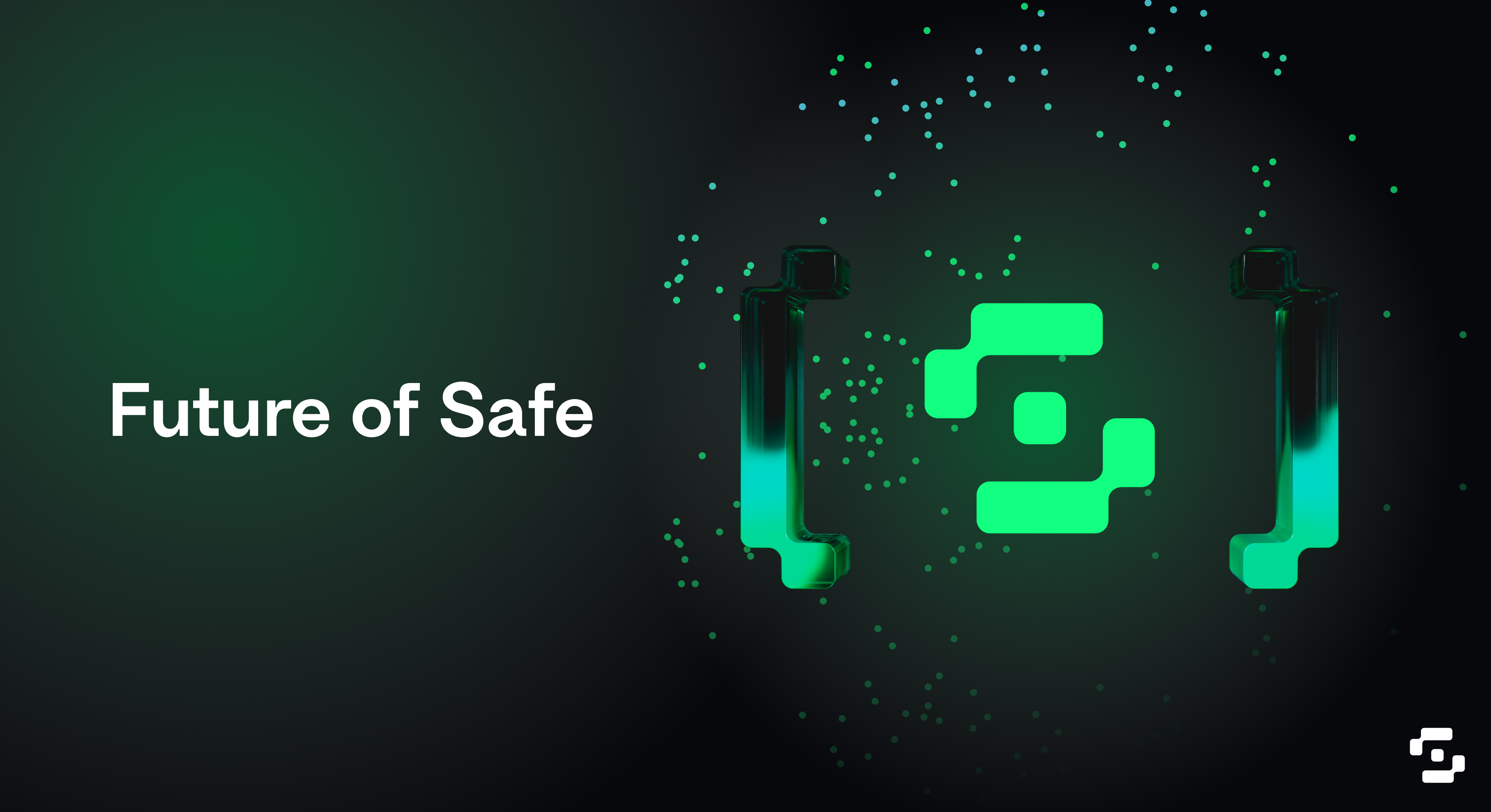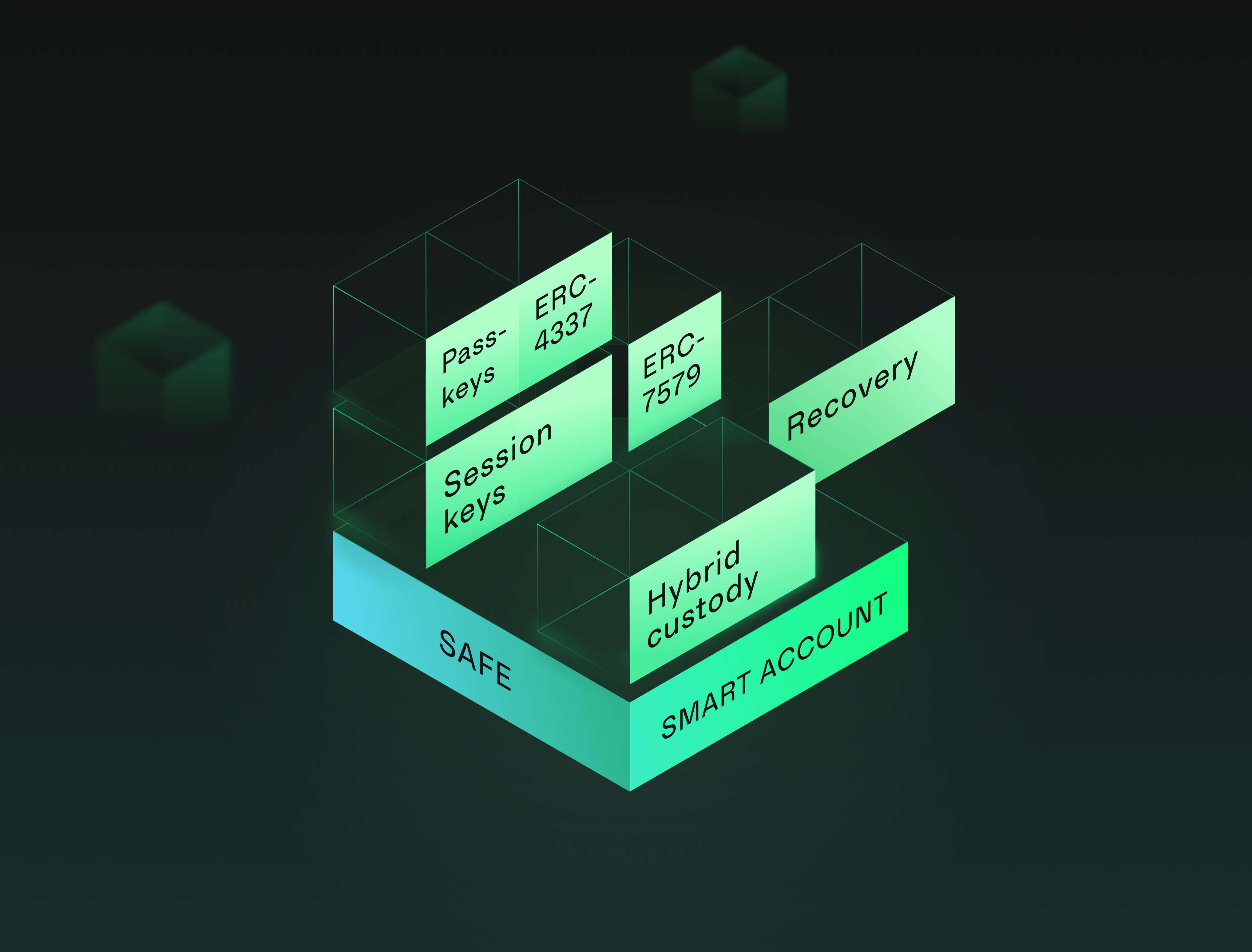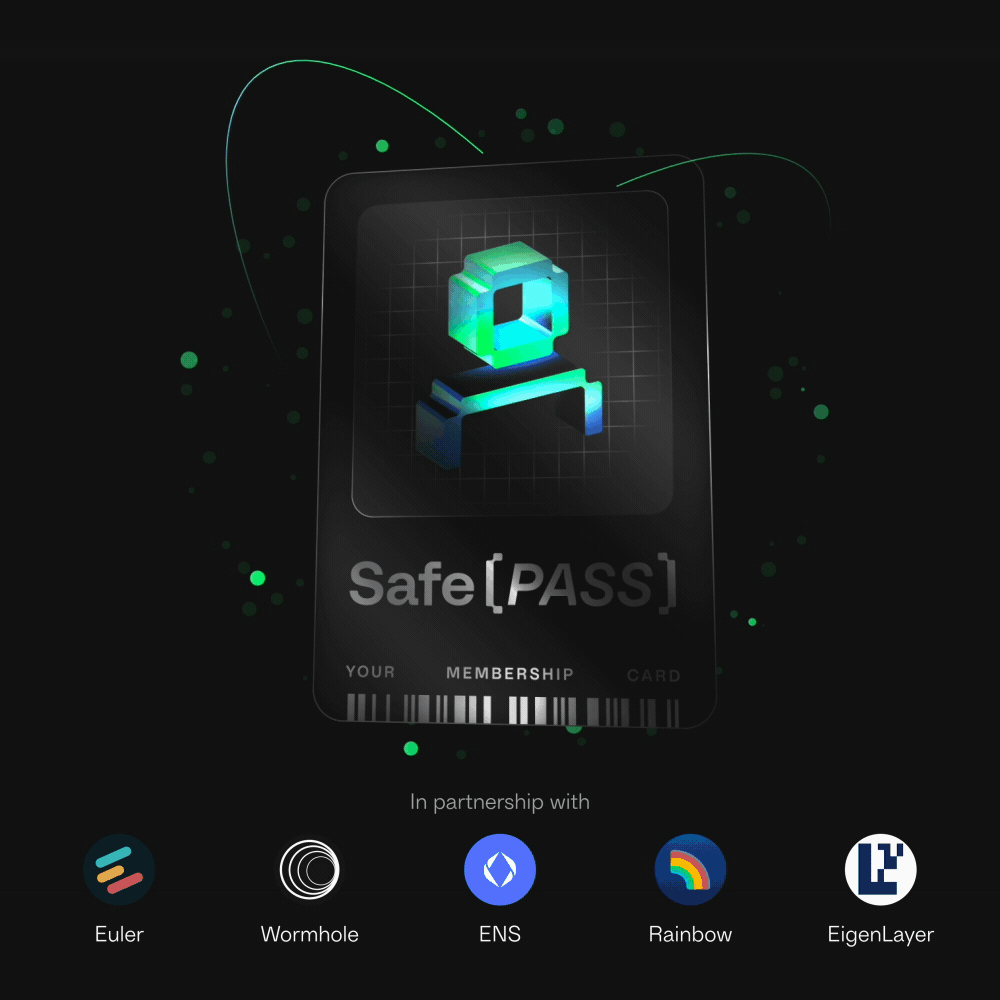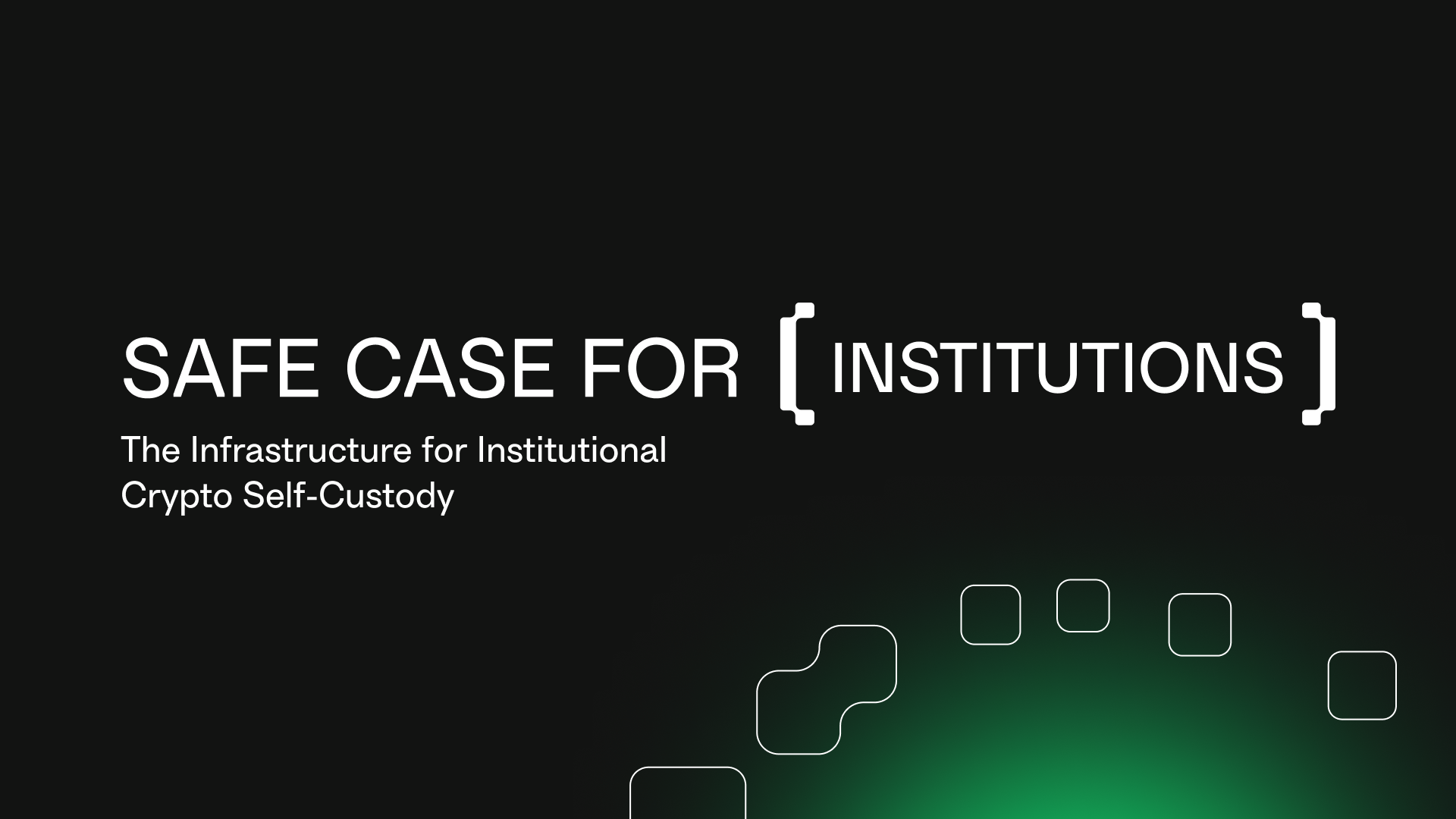Future of Safe
On a mission to turn every web3 user account into a ‘smart account’.

Since its inception in 2018, Safe has been at the forefront of pioneering smart accounts on Ethereum. Safe has now become the largest smart account infrastructure in the industry with over 8 million smart accounts deployed. It has evolved into arguably the most Lindy smart contract on Ethereum holding >100B+ worth of assets and is deployed on 100+ EVM networks.
The core mission of Safe is to accelerate the transition to smart accounts. Through open-source technologies and ecosystem support initiatives, Safe promotes the benefits of smart accounts and enables users and developers to take advantage of them.
But this is just the beginning of the journey to make every web3 user account a smart account.
Why Smart Accounts Matter
Currently, Ethereum interactions mainly utilize Externally Owned Accounts (EOAs), which authenticate transactions through private keys. However, EOAs are basic, lack complex functionalities, and require users to understand private key management, gas fees, and other technical aspects, making accessibility and security a challenge. The full potential of digital ownership requires a more flexible and powerful type of account.
Smart accounts leverage smart contracts for authentication, allowing for flexibility and programmability. The transition from EOAs to smart accounts is similar to the leap from cell phones to smartphones, unleashing a wave of innovation, use-cases and customizations for different user needs. Smart accounts will fundamentally level up the security and UX of Ethereum with features like Multisig, recovery mechanisms, seedless onboarding and more.
 The tip of the iceberg: Smart Accounts unlock a range of UX and security benefits
The tip of the iceberg: Smart Accounts unlock a range of UX and security benefits
The Road to Account Abstraction
In order for smart accounts to become the default user accounts for everyone, they need to become first-class citizens in the Ethereum protocol (commonly referred to as account abstraction or AA).
Status Quo
Recent developments have been promising, with the community embracing ERC-4337 as a stepping stone towards smart accounts. This initiative has sparked the development of a robust ecosystem, laying the groundwork for subsequent enhancements, including the integration of native account abstraction on Layer 2 solutions (RIP-7560) and similar efforts on Layer 1.
ERC-4337 initially got started with high expectations, which helped gather momentum and attract developers. There have been positive signals that we are close to reaching the tipping point, with major exchanges (OKX, Coinbase) and wallets (Trust, Metamask) investing into support for ERC-4337.
The Endgame
One of the key things that needs to be overcome is the fact that legacy users need to be migrated to smart accounts. While many are already migrating organically, there is a need for better migration paths. A recent upgrade to the core Ethereum protocol, EIP-3074, is creating such a stepping stone. EIP-3074 can provide some smart account functionality to legacy wallets while reducing the burden for a full migration. It also allows application developers to build a more cohesive user experience across legacy wallets and smart accounts.
A second Ethereum protocol upgrade, EIP-5003, would allow not just migrating, but fully converting legacy wallets into smart accounts. The combination of two upgrades to the Ethereum protocol, EIP-3074 and EIP-5003, can enable a seamless transition from existing EOAs to smart accounts.
The Ownership Layer: Smart Account Infrastructure
Safe, from its inception, has been driven by enabling onchain ownership of assets, data and identity for all. We also believe ownership should be sovereign, open source and secure and usable. As the only battle-tested smart account in Ethereum, Safe will take leadership in driving this movement forward and collaborate with varied communities to drive the mission of Ownership for all, to realize the full potential of web3.
Safe{Core}
At the core of the Safe Ownership Layer is the Safe Smart Account. It is the unifying element of the Safe Ecosystem and provides interoperability and composability. The Safe Smart Account prioritizes on:
Security: From low-level design decisions such as how delegatecalls are handled, up to off-chain procedures like a $1M bug bounty and formal verification, the Safe Smart Account never compromises on security. Additionally, the $100B assets secured to date create a Lindy effect.
Flexibility: By being built from day 1 as a modular smart account, Safe Smart Accounts can adapt to needs of the user, such as progressive decentralization for DAOs. It also allows Safe Smart Accounts to stay forward-compatible to upcoming standards such as ERC-4337, ERC-7579 and ERC-6900 through adapters.
The Safe Smart Account is built to last. If we want to see major enterprises, big brands and (financial) institutions leverage smart accounts, they need to feel comfortable making long-term investments with minimum risk.
Safe{Core} also includes abstraction layers around the Safe Smart Account:
SDK: Development Kit that allows interacting with Safe Smart Accounts, solving for common developer challenges.
API: Set of endpoints and underlying services that index Safe Smart Account transactions / userOps, allow exchange of off-chain signatures and provide event service.
Safe{Wallet}
Safe{Wallet} serves as a showcase for what Safe Smart Accounts can be used for. While it is primarily used for high-security use-cases today, it is designed to be user-group agnostic, serving as a gateway for everyone looking to take advantage of smart accounts.
Safe{Wallet} found early PMF with its multisig functionality and to date, is used by most DAOs to secure their treasuries. The product continues to innovate in features that focus on security and user experience including:
Counterfactual deployment
Transaction simulation
Risk assessment
Social recovery
More innovations are in the works to make secure asset ownership accessible for everyone.
Ecosystem: Safe is Everywhere
The transition to smart accounts cannot be achieved by a single team. It requires hundreds of teams unlocking the benefits of smart accounts to different user-groups. These teams, building end-user applications, developer tooling, or protocols around the Safe Smart Account, form the Safe Ecosystem. Some of the larger areas which already are being explored within the Safe Ecosystem are shown below. A full list of the 200+ ecosystem applications can be found here.
 A full list of the 200+ ecosystem applications can be found at ecosystem.safe.global
A full list of the 200+ ecosystem applications can be found at ecosystem.safe.globalThe Safe Ecosystem Foundation was established with $100M backing to foster the growth of the Safe Ecosystem and the strengthening of Safe Smart Account infrastructure via initiatives such as:
Funding: Through grants, accelerators, and investments, the foundation provides financial support to promising projects that align with the Safe Protocol’s objectives.
Gas Sponsorship: An initiative aimed at reducing the entry barriers for new users and developers by covering the gas costs. Starting with Base and gradually expanding this to more networks.
Education and Events: Educational initiatives, co-marketing, event sponsorships and flagship events like Safe{Con} to spread knowledge, encourage collaboration, and showcase innovations within the Safe Ecosystem.
Roadmap
Cross-chain: Embracing a thousand L2s
Ethereum has long been not just a single blockchain. It’s evolved into a set of interconnected networks through its rollup-centric roadmap. In the coming years, thousands of rollups may emerge, bringing opportunities and challenges to smart accounts.
A designated team was formed around the objective to cease opportunities and mitigate challenges for Safe in this rollup-centric future, making sure Safe can scale alongside Ethereum.
L2s, Powered by Safe
Layer-2 solutions present a new opportunity to prioritize smart accounts from the outset. World Chain, a new L2 launching soon by Worldcoin, is leading the charge for networks that onboard their users primarily to Safe Smart Accounts.
Worldcoin has deployed millions of Safe Smart Accounts to date and is planning to migrate them to World Chain over the next months. In the future we will see more L2s experiment with native account abstraction (RIP-7560) or lean into smart accounts in different ways. In the Optimism ecosystem, the Safe Smart Account even comes pre-deployed on every new OP Stack chain and is a core part of the Superchain Dev Console.
Network Abstraction
While individual L2s optimizing on smart accounts will be a major unlock, achieving cross-chain functionality remains a challenge. A promising solution are keystores, which separate authentication logic from account assets and apply consistent authentication across networks using zero-knowledge proofs. This approach, developed collaboratively by multiple teams, aims to substantially enhance the cross-chain experience of smart accounts and be fundamental to fully abstracting networks from end-users.
Wallet Chains
With the emergence of app-chains, there will also be application-specific rollups for wallets. Paired with cross-chain patterns such as keystores, this can enable better user experience for users but also unlock new business models for wallets. Safe aims to be the underlying infrastructure for these upcoming wallet chains, forming an interoperable and synergetic ecosystem.
Modular Smart Accounts: The “App Store” Moment
Smartphones unlocked countless ways to extend the functionality of mobile phones, creating a vibrant and sustainable developer ecosystem. In a similar way, smart accounts will enable the creation of marketplaces for modules/plugins, serving similar purposes to the App Store:
Curation/Security: Similar to how app stores curate applications, modular smart accounts can utilize registries to ensure that all modules meet security (or other) standards.
Distribution: This modular system also creates a vibrant marketplace where developers can offer specialized modules, allowing them to reach a global audience. This ecosystem fosters innovation and competition, driving the development of new features and capabilities.
Revenue streams: Incorporating in-module payment systems can simplify processes like transaction fee payments, enhancing the overall user experience and efficiency—akin to in-app purchases in mobile applications.
Initial specifications towards a marketplace framework were started last year and projects like Rhinestone, ZenGuard are working on critical infrastructure and tooling. Also, the community is aligning on standards like ERC-7579 (backed by Rhinestone, zerodev, Biconomy, OKX) and ERC-6900 (backed by Alchemy) that will provide a foundation for module marketplaces to be built and used safely.

Crossing the chasm: Turning 1B people into digital owners
We start to approach the maximum of users that can realistically be onboarded to simple EOA-based wallets. To bring a billion users onchain, a transition to smart accounts is needed, making Ethereum a more viable option for less technical audiences and use-cases, as well as large brands building solutions. While smart accounts have been primarily used for high-value use-cases due to features such as Multisig, the next months will focus on retail-oriented features.
Sponsored transactions
Users can transact without needing to own cryptocurrency themselves, as transaction fees are paid by third parties or service providers.
Passkeys
Offers a simpler and more secure authentication method, with a private key type natively supported by consumer products such as smartphones and laptops. E.g. see Cometh's or Candide’s Passkey solution.
Recovery
Enables users to recover access to their accounts easily and securely, even if they lose their private keys, through predefined recovery mechanisms.
Session Keys
Allows to give temporary or restricted permissions to applications, to streamline the risk of low-risk actions such as in a gaming context.
Hybrid Custody
Instead of choosing between self-custody and third-party custody, smart accounts will enable hybrid solutions where certain permissions can be delegated to trusted parties (such as co-signing transactions or recovery). For example, exchanges could provide web3 wallets that still allow the exchange to recover the wallet if their users lose their keys. Another example is a trusted bank like Sygnum providing custodial recovery services.
These and more innovations emerging this year will make security accessible for the next wave of users onboarding to Ethereum.
Finding the Balance: Value Creation and Value Capture
Over the coming months, various initiatives will explore ways in which value in the Safe Ecosystem can be created, captured and distributed.
Community-aligned fees
Over the next few days, Safe{Wallet} will introduce a first example of how fees can be aligned with community interests. There will be further experiments throughout 2024.
Tokenize Value
The Safe Smart Account provides new opportunities to create utility for the SAFE token. Mechanisms should be created to link the growth of the Safe ecosystem to the growth in utility of SAFE, with the SafeDAO being involved in defining and evolving the SAFE Token utility, including funding of workstreams.
Commitment to open-source
Every line of code that was written for Safe’s production-software Safe{Wallet} and Safe{Core}, was open-sourced. There is a strong commitment from SafeDAO to keep the core Safe Smart Account token-less and focus future SAFE Token utilities on complementary protocol components.
Launching Safe{Pass}
The coming years are crucial for the adoption of smart accounts so it will be important to collaborate as an ecosystem to solve complex challenges. In order to create momentum for the transition to smart accounts, the Safe{Pass} initiative was formed. The Safe{Pass} program rewards activity in the Safe Ecosystem, with various rewards from Safe and other mission-aligned projects such as EigenLayer, ENS (Ethereum Name Service), Euler, Rainbow, Wormhole.

Feel free to reach out, if you are part of a project that would also like to push towards smart account adoption and be part of Safe{Pass}.
Today, a new chapter has turned for Safe, but it is also just the beginning. The future is bright as we collaborate our efforts together as one Safe Ecosystem, and move closer every day, towards the vision of being the Internet ownership layer: where every user account is a smart account.
Follow Us!
Work with Safe
Read more

Get the Alpha
Sign up to hear the latest from Safe in your inbox
©2023–2024 Safe Ecosystem Foundation


